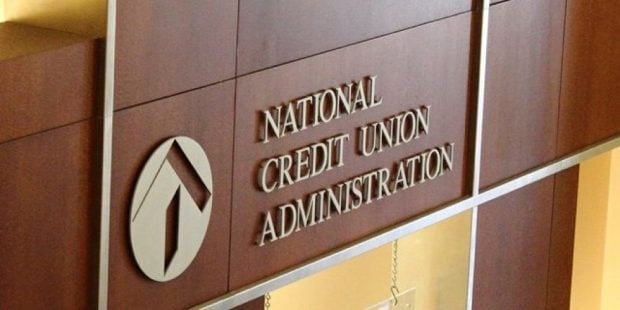 Lobby of the NCUA.
Lobby of the NCUA.
Banking trade groups have called on the NCUA to kill plans to issue rules that would allow CUSOs to expand their lending services.
In comments submitted to the agency, the American Bankers Association and the Independent Community Bankers of America said that the NCUA does not have the power to expand the services and that any expansion would pose risks to the Share Insurance Fund.
Recommended For You
And they asked that the proposed rule be withdrawn from consideration.
In January, the NCUA board adopted a proposed rule that would expand the types of activities that CUSOs perform. The proposed rule would allow CUSOs to originate any type of loan that a federal credit union may originate and would provide the agency board with more flexibility in determining the legal activities of CUSOs.
Many of the comments from the bankers echoed the reaction of NCUA Board Chairman Todd Harper. At the time the proposed rule came before the board, Harper, a Democrat, was not chairman. Republican Rodney Hood was chairman and he and fellow Republican Kyle Hauptman voted to solicit comment on the plan. Harper voted against it.
Harper said the rule would allow CUSOs to become indirect auto lenders and payday lenders, adding that the NCUA has no authority to supervise the organizations for compliance with consumer protection laws.
"I would like to examine why we are even considering this proposal today. It is certainly not COVID related," he said at the January meeting. "There is no economic analysis to make the business case for expanding this unfettered lending authority."
He added, "Why are we spending our time and valuable staff time on another proposal that is not ready for prime time?"
Hauptman and Hood voted in favor of the proposed rule, while Hauptman said it is "unfounded" that CUSOs would do anything to harm credit union members.
In comments submitted to the NCUA board, Timothy Keehan, vice president and senior counsel for the American Bankers Association, wrote that between 2008 and 2015, nine CUSOs caused more than $300 million in losses to the Share Insurance Fund.
"We believe that the proposal improperly expands the range of permissible lending activity for CUSOs," he said.
And Keehan agreed with Harper that the proposal was rushed.
"Inexplicably, (the) NCUA did not undertake or provide an economic or regulatory impact analysis to weigh the proposal against these critical risks," he wrote. "This omission, among other concerns, prompted the NCUA board chairman to question, criticize and ultimately commit to vote against, the proposal."
Keehan said the proposal should be withdrawn until the NCUA is given statutory authority to supervise CUSOs and until the agency performs an economic analysis to determine its impact on the Share Insurance Fund.
In his letter to the agency, Michael Emancipator, the ICBA's vice president and regulatory counsel, said the proposed rule would severely deregulate CUSOs without implementing appropriate safeguards.
He also noted that the agency does not have examination and supervision powers over the organizations.
"This lack of examination and supervision presents a significant regulatory blind spot on the credit union sector; and if (the) NCUA were to finalize this proposed rule, it would exacerbate the existing problems that arise from the inability to supervise CUSOs," he wrote.
He warned that if the NCUA insists on adopting a final rule, the ICBA intends to ask the Financial Stability Oversight Committee to study whether "CUSOs present a systemic risk to the NCUSIF, and whether prudential oversight of CUSOs is warranted."
Before joining the ICBA, Emancipator was NAFCU's senior regulatory affairs counsel.
It is not clear when — or even if — the NCUA board will vote on a final rule. Hood last month said that the board has a backlog of proposed rules that could be voted on to finalize them. He asked Harper to work with the Republican board members to reach a bipartisan agreement.
Harper said he would do that.
© Touchpoint Markets, All Rights Reserved. Request academic re-use from www.copyright.com. All other uses, submit a request to [email protected]. For more inforrmation visit Asset & Logo Licensing.






